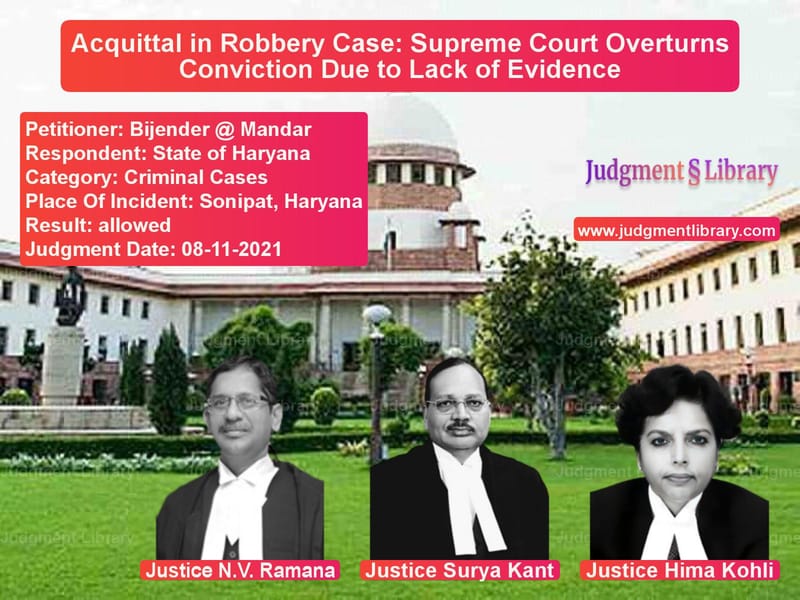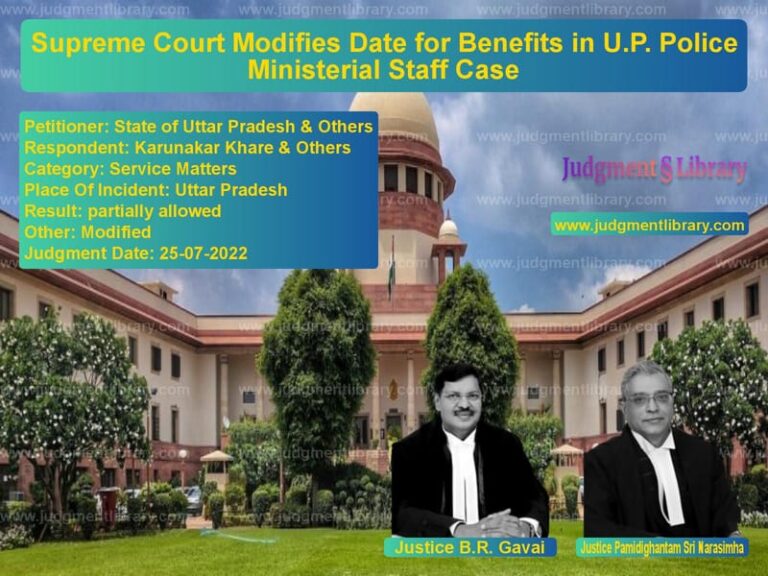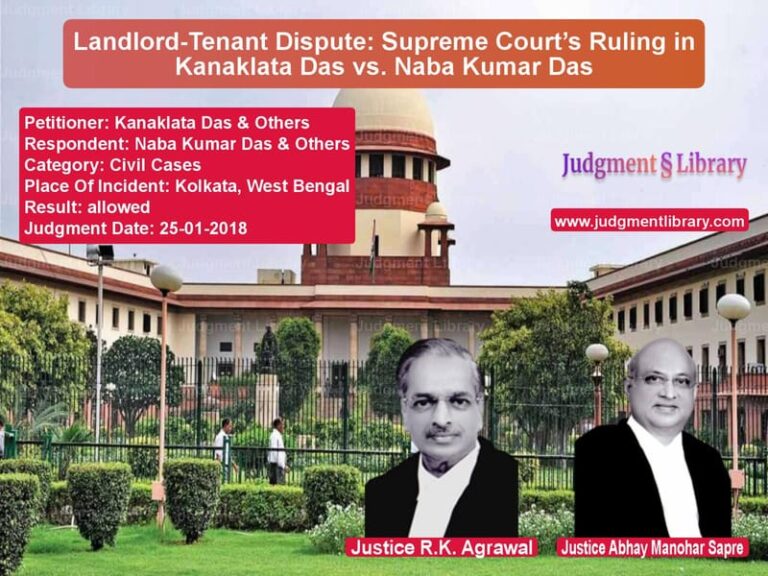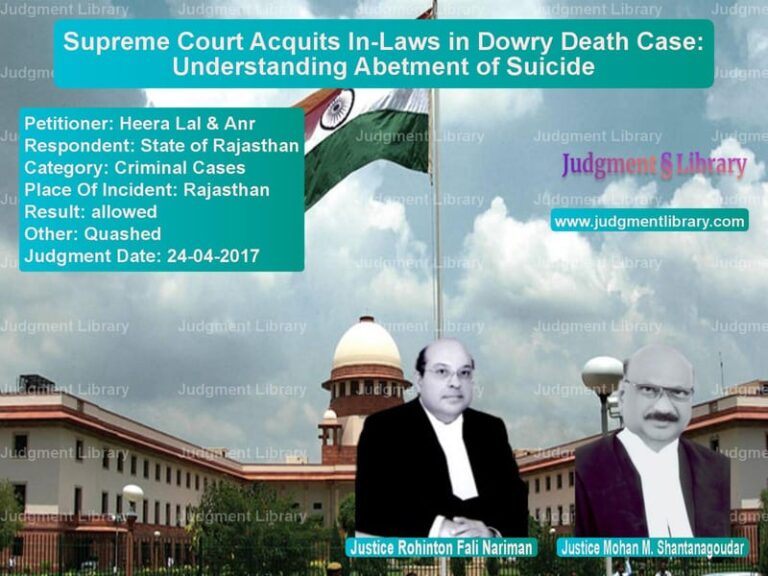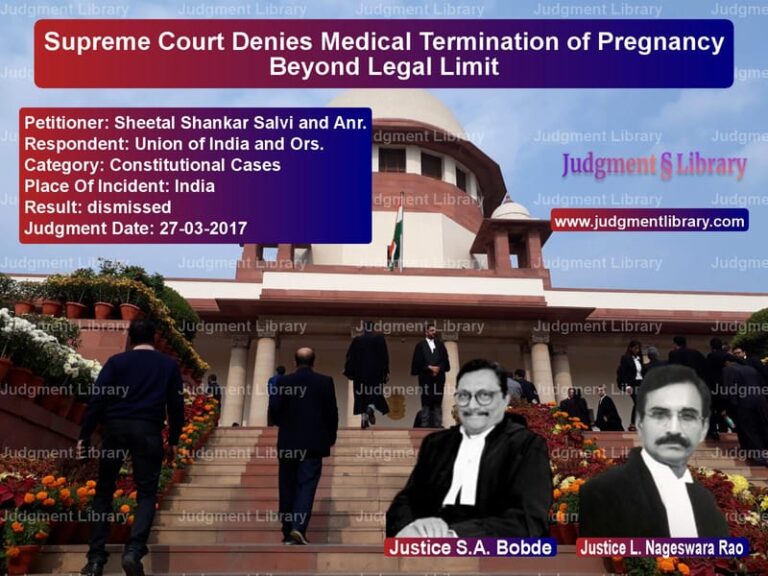Acquittal in Robbery Case: Supreme Court Overturns Conviction Due to Lack of Evidence
The case of Bijender @ Mandar vs. State of Haryana revolves around a robbery incident and the subsequent conviction of the appellant under Sections 392 and 397 of the Indian Penal Code (IPC). The Supreme Court was tasked with determining whether the appellant’s conviction was justified based solely on a disclosure statement and recovery of items allegedly linked to the crime.
Background of the Case
On 14th April 1999, at approximately 11:00 AM, the complainant, Bal Kishan, was traveling on his motorcycle with his nephew, Sanjay, towards Delhi to purchase a plot of land. He was carrying a sum of Rs. 46,000 for this purpose. While passing near the farmhouse of one Virender Bansal on Jatheri Road, he was intercepted by a vehicle. The appellant and another accused, Manjeet, allegedly emerged from the vehicle, brandished country-made pistols, and demanded money.
The complainant handed over his motorcycle key, after which the accused took a bag containing the money and fled the scene. The complainant then proceeded on foot to the nearest police station but encountered ASI Rajinder Kumar (PW-14) on the way and reported the crime. Based on this complaint, an FIR was lodged, and an investigation commenced.
Legal Proceedings
Four accused, including the appellant, were arrested based on secret information received by the police. They were charged under Sections 392, 397, and 120B IPC, along with Section 25 of the Arms Act. A fifth accused, Vinod, evaded arrest and was declared a proclaimed offender under Section 82 CrPC.
During the trial, the prosecution heavily relied on the disclosure statements of the accused and the recoveries made based on these statements. The trial court convicted the appellant and sentenced him to rigorous imprisonment:
- 5 years under Section 392 IPC with a fine of Rs. 5,000.
- 10 years under Section 397 IPC with a fine of Rs. 10,000.
On appeal, the Punjab and Haryana High Court upheld the conviction but reduced the sentence under Section 397 IPC to 7 years.
Arguments by the Petitioner (Bijender @ Mandar)
- The conviction was solely based on a disclosure statement and recovery, with no independent corroboration.
- Key prosecution witnesses, including the complainant (PW-4) and his nephew (PW-6), turned hostile and did not support the prosecution’s case.
- No test identification parade (TIP) was conducted to establish the appellant’s identity.
- There was no direct evidence linking the appellant to the crime.
Arguments by the Respondent (State of Haryana)
- The appellant’s disclosure statement led to the recovery of Rs. 5,000, a red cloth allegedly belonging to the complainant’s wife, and a passbook.
- The recovery was sufficient evidence to establish the appellant’s guilt.
- Despite witnesses turning hostile, the police investigation provided sufficient material to support the conviction.
Supreme Court’s Observations
The Supreme Court, comprising N.V. Ramana, Surya Kant, and Hima Kohli, examined the validity of the conviction based on the evidence presented.
The Court noted:
“The prosecution has miserably failed to bring home the guilt of the appellant, and the courts below have been swayed by irrelevant considerations, such as the rise in dacoity incidents.”
The Supreme Court highlighted the following critical points:
- All key eyewitnesses, including the complainant, turned hostile and failed to identify the accused.
- The recovery of items such as the red cloth and passbook was highly suspect, as the complainant himself denied their connection to the crime.
- The absence of an identification parade weakened the prosecution’s case significantly.
- The prosecution did not provide a compelling explanation for how the accused were identified in the first place.
The Court further stated:
“It is a cardinal principle of criminal law that an accused cannot be convicted merely on the basis of suspicion or weak circumstantial evidence. The prosecution must establish guilt beyond a reasonable doubt.”
Final Judgment
The Supreme Court ruled that:
- The evidence on record was insufficient to establish the guilt of the appellant beyond a reasonable doubt.
- The conviction based on disclosure statements and recoveries without independent corroboration was legally unsustainable.
- The appellant was acquitted of all charges, and his bail bond was discharged.
Impact of the Judgment
The ruling has significant implications for criminal law:
- Strengthening Burden of Proof: The decision reinforces that criminal convictions must be based on strong, direct evidence.
- Protection Against False Convictions: The ruling ensures that accused persons are not convicted based solely on police recoveries.
- Importance of Independent Corroboration: The case underscores the need for corroborative evidence in criminal trials.
- Judicial Safeguards: The judgment serves as a reminder that courts must not be influenced by external factors such as rising crime rates when determining an individual’s guilt.
Conclusion
The Supreme Court’s ruling in Bijender @ Mandar vs. State of Haryana serves as a crucial precedent in upholding the rights of the accused in criminal trials. By overturning a conviction based on weak evidence, the judgment reinforces the principle that an accused must be proven guilty beyond a reasonable doubt. The ruling ensures that justice is served while preventing wrongful convictions.
Petitioner Name: Bijender @ Mandar.Respondent Name: State of Haryana.Judgment By: Justice N.V. Ramana, Justice Surya Kant, Justice Hima Kohli.Place Of Incident: Sonipat, Haryana.Judgment Date: 08-11-2021.
Don’t miss out on the full details! Download the complete judgment in PDF format below and gain valuable insights instantly!
Download Judgment: bijender-@-mandar-vs-state-of-haryana-supreme-court-of-india-judgment-dated-08-11-2021.pdf
Directly Download Judgment: Directly download this Judgment
See all petitions in Bail and Anticipatory Bail
See all petitions in Theft and Robbery Cases
See all petitions in Fraud and Forgery
See all petitions in Judgment by N.V. Ramana
See all petitions in Judgment by Surya Kant
See all petitions in Judgment by Hima Kohli
See all petitions in allowed
See all petitions in supreme court of India judgments November 2021
See all petitions in 2021 judgments
See all posts in Criminal Cases Category
See all allowed petitions in Criminal Cases Category
See all Dismissed petitions in Criminal Cases Category
See all partially allowed petitions in Criminal Cases Category

